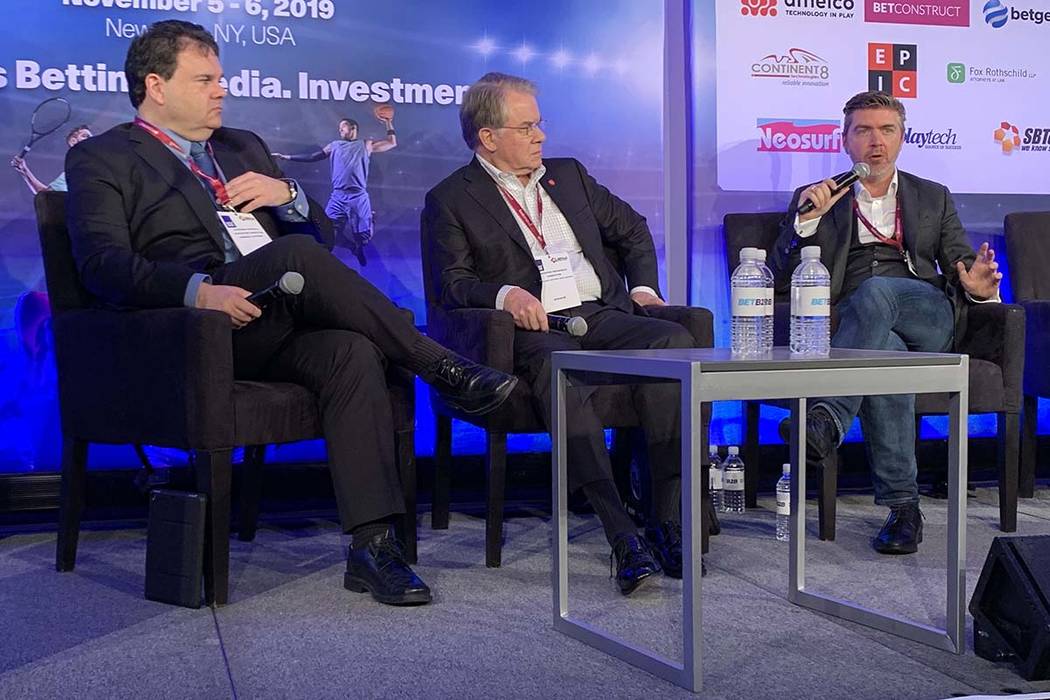Panel: Media companies cautious as states legalize sports betting
NEW YORK — U.S. sports betting legalization is expected to be a bonanza for media companies, but executives at an industry conference this week said they are moving forward with plans cautiously amid market uncertainty.
Jeff Gerttula, executive vice president and general manager at CBS Sports Digital, said there is still “some confusion” as the new industry unfolds in real time and media companies still don’t have all the answers to the rules of engagement.
“This is going to be a long game, and every move that we make now — we just have to be careful that we don’t put ourselves in a spot that we regret in a few years,” he said Wednesday during the Sports Betting USA & Investors Summit in New York in response to a question about why some media companies seem to be moving slowly.
“So I think everyone is biding their time, making sure that they are making the right decision based on all the information they have.”
The U.S. Supreme Court overturned a decadeslong ban on wagering in most states just 18 months ago, creating a new, multibillion-dollar market overnight with implications for companies in a wide range of industries, including media, technology, casino, lottery and marketing.
The majority of states have yet to legalize wagering, and there is no uniformity on rules governing the industry.
Cautious moves
Media companies will have to develop dedicated shows and websites for sports betting, rather than inundate current shows with industry lingo and data, panelists said.
“The sportsbooks that we are working with and leagues are all pretty cognizant of not oversaturating the airwaves and turning people against sports betting. Everybody is being pretty cautious,” said Jim Mattson, vice president at Fox Home Team Sports.
Brian Musburger, the CEO of the Las Vegas-based VSiN sports-betting network, said media companies can create alternative broadcast feeds — what he called a “second screen” — for the sports betting crowd and those novices who want to learn more about the industry.
Sports bettors are used to handling several screens at once, he said.
“Everybody in this space is going to be spending a lot of resources figuring out how to create that perfect alternative broadcaster,” Musburger said.
That is one factor pushing media companies to seek industry partnerships, the panelists said.
“We are seeing an increased level of partnerships, and we are seeing a tremendous amount of integration across the industry,” Mattson said.
The integration of media and sports will result in bettors being able to stream live games within an operator’s sports betting app and bet on it in real time, he said.
“We are probably a little while away from being able to do that with the larger sports like MLB or NFL,” he said.
Andrew Patterson, vice president for business development at BetGenius, said his firm just launched a new streaming service for sportsbooks, but agreed it would be a few years before the big leagues signed on.
Sports bettors tuning into industry broadcasts are hungry for information about what books are seeing, including the breakdown of bets on a particular game and amounts wagered, Musburger said.
However, many sportsbooks want to keep that data “hidden” because they fear it could hurt their profits, he said.
“People want to hear about the big bets coming in. The more open (books) can be with this data, the better it is for everyone,” Musburger said.
Patterson, who is based in Vegas, said Strip operators don’t yet have the technology to process that wagering data quickly and get it to sports bettors.
The panelists said delivering quality data to bettors will be essential to industry success and will require major investments in the coming years.
“The tolerance for getting (the data) wrong is already low, and in the future it is going to become more complicated,” Gerttula said.
“So what I think you are going to see is a lot of the major media companies retrenching their investments around their data infrastructures because the stakes are immediately higher,” he said.
Other players
Representatives of state lotteries and affiliate websites told the audience at Sports Betting USA that they too are seeking to get their share of the growing wagering pie.
Catena Media, a Malta-based online lead generation firm, has scooped up several American gaming and sports-betting websites since 2016 and plans further expansion as more states legalize wagering, said Michael Daly, general manager for the U.S.
Catena-owned websites seek to inform people about sports betting and placing bets, such as the definition of what a moneyline is, where betting is legal and what kind of money is acceptable. The websites then earn money by directing readers to particular operators.
“Somebody has to answer those. The operators don’t have the interest really in just educating for the sake of educating. We can, because we educate, and then some of these we are able to turn into customers for operators,” Daly said.
Other European affiliate marketing companies have entered the U.S. gaming and sports betting markets as more states legalize online gaming and sports betting.
Daly said media companies and leagues should consider using affiliates — rather than doing direct deals with operators — to isolate themselves from potential risk.
If a bettor feels cheated by an operator, the media company or league that recommended the operator could see its brand damaged, he said.
Media executives at the conference said they are open to working with affiliates, but said it is still an unfamiliar industry to them.
State lottery officials also pitched themselves as industry players, dismissing the notion that they cannot operate in the more complicated business of sports betting as well as brick-and-mortar casinos.
Gordon Medenica, the director of Maryland Lottery & Gaming, pointed out that major lottery vendors such as Scientific Games, IGT and Intralot all offer sports betting infrastructure.
There is room for both casinos and state lotteries as they draw business away from illegal operators, he said.
Todd Prince is a former Las Vegas Review-Journal business reporter.
Jersey Growth
Former New Jersey State Sen. Ray Lesniak, who led the push to overturn the U.S. ban on sports betting, told participants at the conference that he expected states to move quicker on legalization.
"I am surprised sports betting hasn't blossomed across America. Just look at the results of New Jersey. Thousands of unemployed casino workers back at work."
Lesniak said wagering has helped revive Atlantic City, which he said had been a "ghost town" in the offseason.
The beachfront resort town is now full during the Super Bowl and NCAA championship, he said.
Even though people in New Jersey can place wagers through their mobile phones, bettors "like to be where the action is," said Lesniak, who left the senate in 2018 after 35 years.
Lesniak said legalization of sports betting had helped boost New Jersey tourism and overnight stays in Atlantic City.
"What mystifies me is why California hasn't recognized the tourist boom that sports betting will bring and why New York has turned its back on millions of dollars of revenue from online sports betting," he said.
He predicted New York would legalize mobile betting in two years and that California voters would pass a referendum to allow wagering.
Related
Sports betting continues to be hot topic of the casino industry
Betting at Indiana's recently opened sports books strikes paydirt
New Jersey casinos woo bettors with new sportsbooks
7M say they'll bet on NFL, thanks to repeal of sport betting ban



















